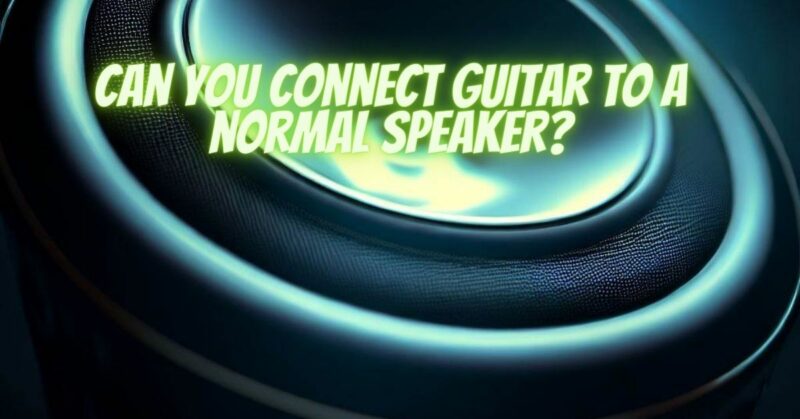Guitars are versatile musical instruments that produce beautiful sounds, often amplified through guitar amplifiers designed specifically for this purpose. However, many guitarists may wonder if they can connect their guitars directly to normal speakers, such as home stereo speakers or studio monitors. While it is possible to connect a guitar to a regular speaker, there are important considerations and limitations to keep in mind. This article explores the compatibility of guitars with normal speakers and provides insights into the practicality of this setup.
Impedance and Power Handling
One of the primary concerns when connecting a guitar to a speaker is impedance matching and power handling. Guitar amplifiers are designed to provide a specific output impedance, usually 4, 8, or 16 ohms, which matches the impedance of the guitar speaker cabinet. Regular speakers, on the other hand, have varying impedance ratings, often falling in the range of 4 to 8 ohms for home speakers and studio monitors.
Connecting a guitar directly to a normal speaker with a mismatched impedance can lead to several issues:
- Signal Loss: Impedance mismatch can cause signal loss, resulting in weak sound output from the speaker.
- Overloading the Amplifier: If the normal speaker’s impedance is too low, it can put additional strain on the guitar amplifier, potentially leading to overheating or damage.
- Damage to the Speaker: Conversely, if the normal speaker’s impedance is too high, it can cause the amplifier to push too much power, potentially damaging the speaker.
To avoid these problems, it is essential to use a proper impedance matching device, such as an attenuator or a direct box with a speaker simulation feature, when connecting a guitar to a normal speaker.
Frequency Response and Tone
Guitar speakers are specifically designed to enhance the unique tonal characteristics of guitars. They are designed to handle the specific frequency range produced by electric guitars, which typically includes a significant emphasis on midrange frequencies.
Normal speakers, especially home speakers and studio monitors, are designed for accurate audio reproduction across a broader frequency range, including lows, mids, and highs. As a result, connecting a guitar to a normal speaker can lead to a more balanced and less colored tone compared to the distinct sound of a guitar speaker cabinet.
Sound Level and Distortion
Guitar amplifiers and speakers are designed to deliver a specific level of distortion, which is an essential component of the electric guitar’s sound. Connecting a guitar to a normal speaker may not produce the same level of distortion, and the tone may sound cleaner and less saturated.
Furthermore, normal speakers might not have the necessary power handling capabilities to handle the higher output levels of a guitar amplifier. Attempting to achieve higher volume levels by connecting a guitar to a normal speaker can lead to speaker damage or inadequate sound output.
While it is technically possible to connect a guitar to a normal speaker, it is essential to consider the impedance matching, power handling, and frequency response factors. To achieve the best results, it is recommended to use dedicated guitar speaker cabinets or guitar amplifiers with their matched speakers. If connecting to a normal speaker is desired, using an impedance matching device and being mindful of the sound characteristics can help achieve a satisfactory audio experience. Always exercise caution and ensure proper equipment compatibility to prevent damage to your guitar, amplifier, or speaker system.


